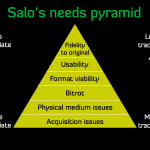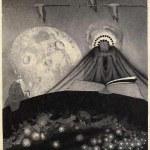I hear talk about "the cloud" as the solution to research data curation. Data will waft softly up into "the cloud," and "the cloud" will look after it and give it back on demand, and there will be unicorns and rainbows and rainbow-colored unicorns, and—well, you get the idea.
I think this is bosh. Balderdash. Bunkum. But I also think it's worth unpacking why this is a popular and recurring idea, because there's the germ of a service design in there.
"The cloud" means a lot of things to a lot of people, but for the sake of argument, let's call it "third-party data-storage services" such as…

Monado of Science Notes commented on my irreplaceable-data post thusly:
It sounds as if the best thing to do in the short term is not throw away the old equipment. And to use the old equipment to copy digital media to newer forms... for which no one ever gets a budget, right?
It's such a great comment that I want to unpack it a bit. As we work out our data praxis, this kind of question is exactly what we have to confront.
My first question is simple: What equipment are we talking about here? Using what media?
Libraries are wearily familiar with this question in (mostly) analog terms. We have…
Unconnected incidents are making me ponder questions of sustainability. I don't have any answers, but I can at least unburden myself of some frustrations!
I learned from a colleague that arXiv is looking for a new funding model, as Cornell is wearying of picking up the entire tab. Various options are on the table, and I'm not competent to opine on their feasibility. I'm more interested in the larger question: how are we, we libraries and we researchers, organizing to shoulder the burden of electronic archives, especially open-access ones?
Historically, the answer has been "not effectively." I…
Yesterday the city of Louisville suffered a freak thunderstorm that dumped half a foot of rain in an hour and a quarter. Their library has been devastated, to the tune of a million-plus dollars in damage.
As a proud member of The Library Society of the World (and I have the Cod of Ethics to prove it!), I ask anyone who is able to throw a few bucks their way. I trust Steve Lawson to do as he says he'll do.
The library's data center and systems office were on its ground floor. If you watch Greg Schwartz's Twitterstream you can keep up with the recovery efforts. For my purposes, though, I want…
I cringe. I've accepted an invitation to speak somewhere, and an email comes back asking me politely for a bio. Cringe. Every single time. It's downright Pavlovian.
I loathe, despise, abominate, and abhor writing professional bios.
However. There's a point to the exercise: situating myself in context, so that folk can decide whether I'm worth listening to in the first place, evaluate my expertise and my biases, and make an educated guess about what questions to ask me that I can actually answer. So now that I'm starting to settle down here in my new ScienceBlogs digs, it's time for (dramatic…
All of today's tidbits are from one blog! Well, all but one.
David Rosenthal on digital preservation. I had this bookmarked to blog about, but…
Chris Rusbridge beat me to it, saying everything I would have. Yes, online-versus-offline. Yes, research data in uncommon, niche, and/or proprietary formats. Yes, metadata! And yes, thinking for ourselves.
Semantic Web of Linked Data for Research? In all honesty, my reaction to "Linked Data" can be summed up in Chris's question mark. I am not a fan of RDF, I remain to be convinced that even small, constrained Semantic Webs are feasible given how…
Another thing I meant to call out in the context of the Jupiter-goes-boom event was the nod to data gathered by people who aren't connected to the formal research enterprise save tangentially.
This event was first noted by someone not an astronomer by profession, and the article notes that this is hardly the first time astronomers have been scooped. My husband, who is an extremely amateur skygazer and likes to hang out on online astronomy bulletin boards, says that his impression is that astronomers mingle with enthusiasts fairly freely, all things considered, and both sides appear to benefit…
There's a string of "day in the life" librarian posts happening, so I thought I'd throw one in. Today wasn't a typical day, I suppose… but I don't really have typical days, especially these days.
6:00-ish am: Wake up, kick the cat off the bed accidentally, get out of bed.
6:20 am: Dressed and etceteraed, sit down with laptop to check out the daily news and a few webcomics. (What? It's my routine. It works for me.)
6:50 am: Feed cats before they kill each other. Or me.
6:55 am: Pick up bag and leave house to walk to work.
7:28-ish am: Arrive at work. Show early-admission pass. Trundle up the…
Interesting and perhaps relevant:
Jean-Claude Guédon's examination of power in science. Does e-research destabilize this situation? How? If it doesn't, should it?
Should copyright in academic works be abolished? Makes the obvious point that journal-article authors don't use copyright for its intended purpose of filthy lucre, and extrapolates from there. What I notice is that journal-article authors use copyright as a bulwark against plagiarism, lack of credit, and (whatever they perceive to be) misappropriation. Copyright is a lousy tool for that. We need better ones. Personally, I'd prefer…
Because I've seen it quoted, misquoted, and usually not attributed at all… “Converting PDF to XML is a bit like converting hamburgers into cows." That is the quote I know of. It comes from revered XML developer Michael Kay on the xml-dev mailing list in July 2006.
It's possible Kay got this from somewhere else, but I've never seen an earlier attribution. (Comments are open if I'm wrong.)
I hear all sorts of chest-beating about attribution in data circles, often for good and sufficient reason. I think we can stand to get our quotes and their authors right.
And we're back! (With a four-note theme. Wait, that's Peter Schickele on Beethoven. Never mind.)
So yesterday before our enforced break, I asked what we could learn about e-research from a big chunk of space flotsam hitting Jupiter. What had caught my eye was this passage:
… the planetary astronomy community has been filled with excitement—emails are flying, with people exchanging information about the new discovery and its development. Major observatories are canceling their scheduled observations so that they can point their telescopes at Jupiter.
Why are they doing this? Because this is…
I am reliably informed that there will be a server upgrade going on tonight, so ScienceBlogs will be down for the count until it is complete.
While I'm gone, have a look at the goings-on around Jupiter, and think about what that means in an e-research context. I'll be back with my thoughts!
Cliff Lynch on institutional repositories. I don't agree with quite all of it (institutional repositories are here to stay? really? in this budget environment? sez who?), but an hour with Cliff Lynch is always an hour well spent, and I'm completely and unabashedly with him on his cautions about IRs.
Margaret Dayhoff, a founder of the field of bioinformatics. (Hat tip to blogger Mary.)
Researchers love their disciplines, not their institutions: open-access repositories and the arts. (What does that mean for institution-based e-research efforts?)
Have a high-bandwidth day!
Borgman, Christine L. Scholarship in the Digital Age: Information, Infrastructure, and the Internet. MIT Press, 2007. Worldcat page, Powell's page (no, I get no kickback).
This calm, clear volume provides a thorough grounding in the practices of academic researchers around their publications and their data, and how the Internet is—and in many cases, isn't—changing those practices.
Copiously researched, accurate, and logically presented, the book starts with a 30,000-foot overview of the current situation, then swoops through technology, law and policy, the existing scholarly-communication…
Lively welcome here at ScienceBlogs, I must say. Two posts, a soft launch, and eighteen comments already!
The comments have turned up a question deserving of further discussion. On my first post, commenter Jim Lund said:
E-research? Why make a distinction? Today there's only e-research and archaeology. :)
And on my second, commenter rnb said:
Computers have been used to investigate circuit behavior since I was in college back in the 70s. So should engineers be called e-engineers?
Not trying to put words in their mouths here, but it seems to me they're getting at the same question about how…
That would be the question, wouldn't it. Unfortunately, such fundamental definitions are never simple to create, and even less simple to agree upon. A little history may help explain how we got into this parlous uncertain state, but it may not get us out of it.
The short version of the history (which all and sundry may feel free to correct in the comments) is that the Anglophone world had a terminology breakdown right from the start: what the English called "e-science" the Americans (with our customary tin ear) dubbed "cyberinfrastructure." Then the humanities reared back on their hind legs…
I'm very pleased to welcome you all to The Book of Trogool, a brand-new blog about e-research. My name is Dorothea Salo, I'm an academic librarian, and I am fascinated with the changes that computers have wrought in the academic-research enterprise. I hope to explore those changes, and particularly library responses to them, in the company of the wonderful ScienceBlogs community. My thanks to John, Christina, and Walt for paving the way, and to Erin for welcoming me here.
I hope to tell stories about e-research projects (because narrative is how humans come to grips with novelty), pass on…

